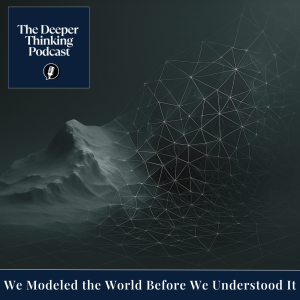
Monday Mar 31, 2025
We Modeled the World Before We Understood It - The Deeper Thinking Podcast
We Modeled the World Before We Understood It
What if science no longer uncovered reality—but generated it?
In an age where AlphaFold predicts faster than biology can observe, and where generative AI simulates truth before it’s tested, the foundations of knowledge begin to shift. This episode explores a quiet revolution in epistemology—one catalyzed by systems trained not to understand, but to perform. When output precedes insight, and the scientific method fades from the spotlight, what does discovery become?
This is not speculation. It’s already here. In computational biology, in climate models, in machine-generated theorems—experience is shaped by architectures that do not require observation. If Kuhn’s paradigms were overturned by anomalies, today’s paradigms are overwritten by structures that exceed justification altogether.
But this is not just a technical shift. It is philosophical, ethical, and human. As observers retreat and models take precedence, we must ask: who decides which version of reality matters? What remains of meaning when the world is rendered before it is known? This episode traverses a new terrain—where simulation precedes perception, and epistemology yields to design.
Reflections
- Is science still discovery—or is it now architecture?
- Can knowledge survive if the path to it is no longer empirical?
- What happens when coherence replaces correspondence as a truth criterion?
- Do generative systems liberate or displace the human imagination?
- What new responsibilities emerge when models outrun meaning?
Why Listen?
- Understand the shift from empirical science to generative architectures
- Explore how AI reconfigures knowledge, observation, and epistemic trust
- Unpack the ethical dilemmas of simulation-first scientific practice
- Reflect on meaning-making in a modelled world
Listen On:
Support This Work
If you'd like to support the ongoing work, you can visit buymeacoffee.com/thedeeperthinkingpodcast or leave a kind review on Apple Podcasts.
Bibliography
- Arendt, Hannah. The Human Condition. 2nd ed. Chicago: University of Chicago Press, 1998.
- Bachelard, Gaston. The New Scientific Spirit. Translated by Arthur Goldhammer. Boston: Beacon Press, 1984.
- Baudrillard, Jean. Simulacra and Simulation. Translated by Sheila Faria Glaser. Ann Arbor: University of Michigan Press, 1994.
- Bridle, James. Ways of Being: Beyond Human Intelligence. New York: Farrar, Straus and Giroux, 2022.
- Crawford, Kate. Atlas of AI: Power, Politics, and the Planetary Costs of Artificial Intelligence. New Haven: Yale University Press, 2021.
- Deleuze, Gilles. Difference and Repetition. Translated by Paul Patton. New York: Columbia University Press, 1994.
- Feyerabend, Paul. Against Method. London: Verso Books, 1975.
- Floridi, Luciano. The Philosophy of Information. Oxford: Oxford University Press, 2011.
- Frigg, Roman, and Stephan Hartmann. “Models in Science.” In The Stanford Encyclopedia of Philosophy, edited by Edward N. Zalta. Summer 2022. https://plato.stanford.edu/entries/models-science/.
- Hacking, Ian. Representing and Intervening: Introductory Topics in the Philosophy of Natural Science. Cambridge: Cambridge University Press, 1983.
- Haraway, Donna. “A Cyborg Manifesto: Science, Technology, and Socialist-Feminism in the Late Twentieth Century.” In Simians, Cyborgs, and Women: The Reinvention of Nature, 149–181. New York: Routledge, 1991.
- Hayles, N. Katherine. How We Became Posthuman: Virtual Bodies in Cybernetics, Literature, and Informatics. Chicago: University of Chicago Press, 1999.
- Jonas, Hans. The Imperative of Responsibility: In Search of an Ethics for the Technological Age. Chicago: University of Chicago Press, 1984.
- Kuhn, Thomas S. The Structure of Scientific Revolutions. 2nd ed. Chicago: University of Chicago Press, 1970.
- Lazzarato, Maurizio. The Making of the Indebted Man. Los Angeles: Semiotext(e), 2012.
- Mitchell, Melanie. Artificial Intelligence: A Guide for Thinking Humans. New York: Farrar, Straus and Giroux, 2019.
- Morozov, Evgeny. To Save Everything, Click Here: The Folly of Technological Solutionism. New York: PublicAffairs, 2013.
- O’Neil, Cathy. Weapons of Math Destruction: How Big Data Increases Inequality and Threatens Democracy. New York: Crown Publishing Group, 2016.
- Parisi, Luciana. Contagious Architecture: Computation, Aesthetics, and Space. Cambridge, MA: MIT Press, 2013.
- Popper, Karl. The Logic of Scientific Discovery. London: Routledge, 1959.
- Sloterdijk, Peter. Foams: Spheres Volume III: Plural Spherology. Translated by Wieland Hoban. Los Angeles: Semiotext(e), 2016.
- Tsing, Anna Lowenhaupt. The Mushroom at the End of the World: On the Possibility of Life in Capitalist Ruins. Princeton: Princeton University Press, 2015.
- Vespignani, Alessandro. “Predicting the Behavior of Techno-Social Systems.” Science 325, no. 5939 (2009): 425–428.
- Wiener, Norbert. The Human Use of Human Beings: Cybernetics and Society. Boston: Houghton Mifflin, 1950.
- Winsberg, Eric. Science in the Age of Computer Simulation. Chicago: University of Chicago Press, 2010.
Before we understood the world, we modeled it. Now the model waits for us to catch up.
#GenerativeAI #SciencePhilosophy #Simulation #ThomasKuhn #Posthumanism #ModelledReality #Bachelard #Hayles #Crawford #Haraway #TheDeeperThinkingPodcast
No comments yet. Be the first to say something!